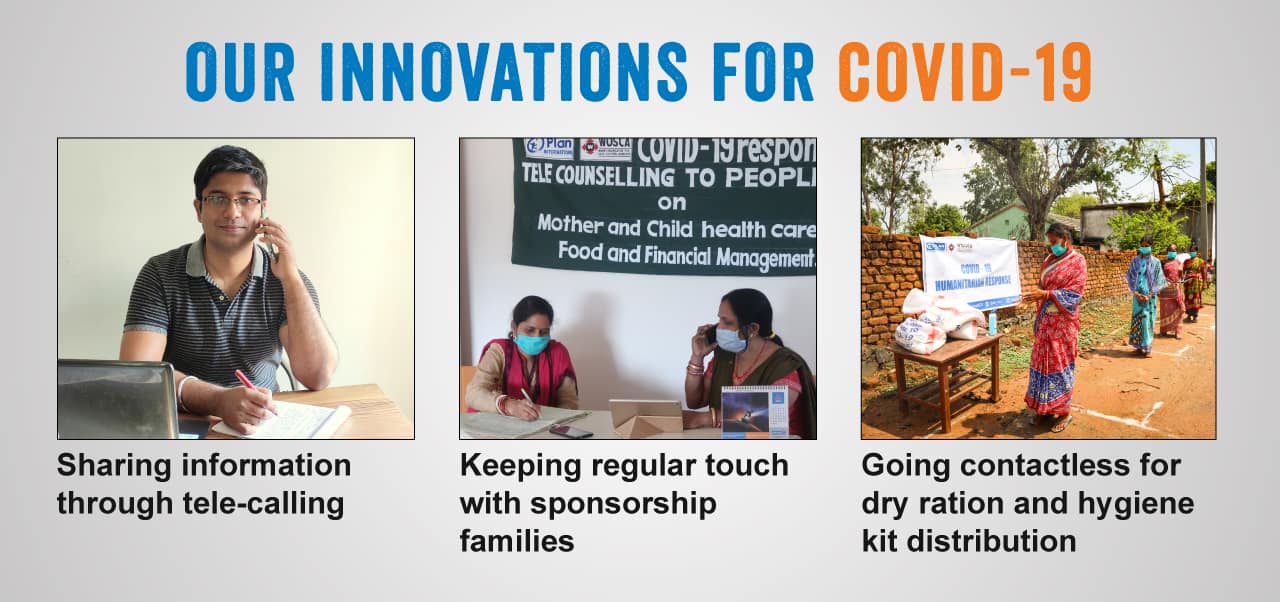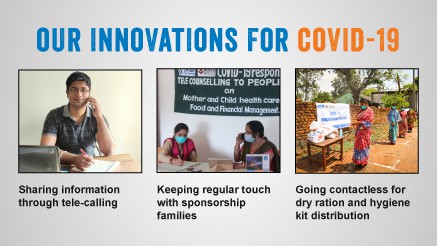At a time when physical distancing has not only become an accepted but also a mandatory norm for survival against COVID-19, Plan India teams are using the means of telecommunication to stay connected with the communities.
Together with the partners, the teams are regularly in touch with the Plan India supported sponsorship families using mobile phones, which provides a useful alternative in the absence of field visits due to the lockdown. The initiative is currently active in Bihar, Jharkhand, Uttar Pradesh, Odisha, Telangana, Rajasthan, Delhi and Uttarakhand.
The field staff and partner organisations are making hundreds of calls every day to keep themselves abreast about the wellbeing, medical condition and other needs of the families. They also counsel them about the safety and preventive measures around COVID–19. In cases where there are pregnant women or undernourished children, the team enquires about any kind of medical support they may need and orient them on COVID-19 symptoms, spread and its precautions. They also ask about the availability of sufficient food and other basic needs. These phone calls are helping Plan India to be on top of the requirements of people and provide them with the required support which includes dry ration and hygiene kits or connecting them to the local medical services.
The teams have reached out to more than 45,000 sponsored children through the initiative, of which 70% were girls and 30% were boys
Watch Plan India’s field staff Rusheela interacting with a sponsorship family over the phone and checking on their well-being
This has been achieved by following a rigorous process of planning and training of the field staff including how to interact, what to say, and the messaging for the telephonic interactions. The teams developed and shared key messages with the members to ensure that every aspect of the community’s well-being is tracked and acted upon accordingly.
The members prepare a day-wise plan to call a certain number of families each day and maintain a call log that is shared with the coordinating team. As a monitoring mechanism, the project leads make random calls to the families to confirm whether they have been contacted or not.
The phone calls have not only helped Plan India to maintain regular touch with the families but have also reassured the communities that we stand with them in these difficult times too.
Going contactless for dry ration and hygiene kit distribution
For Plan India, the safety of the field staff, stakeholders as well as that of the community is a priority. Keeping this in mind Plan India rolled out the contactless distribution of dry ration and hygiene kits across all its operational states.
The distribution work is currently on in nine states including Delhi, Rajasthan, Uttar Pradesh, Odisha, Maharashtra, Andhra Pradesh, Uttarakhand, Jharkhand and Bihar.
The entire process of distribution follows a slew of measures to ensure a 100 per cent contactless distribution. At the distribution centres, a dedicated place is marked where the dry ration and hygiene kits are placed for the family members to come and pick, one at a time. The record-keeping is done through phone calls and photographs and none of the beneficiaries is made to give anything in writing or hold the pen and give thumb impressions. They are also encouraged to cover their faces either by using a mask or with a cloth.
For crowd management, circles, at a distance of a metre and a half, are drawn for people to stand and wait for their turn. The supporting staff too wears a disposable mask, gloves and practices regular handwashing, for which hand sanitisers have been made available at the centres. The people are also encouraged to sanitise their hands before and after taking the packages.
All these steps have ensured zero contact during the distribution process, instilling a sense of safety among the communities as well as Plan India staff. “Contactless distribution has made me feel safe and confident to be part of the distribution process. Our processes are so well defined and strictly followed, that by being part of it the people are now also aware of frequent handwashing, maintaining physical distance, using masks and covering mouth with cloth,” Geeta, a field officer in Delhi shared.
As on June 9, the Delhi team following contactless distribution has distributed dry ration to a total of 10,878 families and hygiene kits to 9171 families.
“My husband was working as a daily wager in a brick factory. Due to the lockdown, he had to return home as he could not continue his work. I became worried after all of our small savings were exhausted. At that time, we received dry ration and hygiene kits from Plan India. Standing by us during this crisis, the organisation proved its humanity. We are grateful forever for such humanitarian assistance,” said Jingi Danga, from Kaptipada, Odisha.






